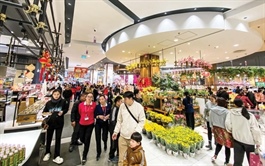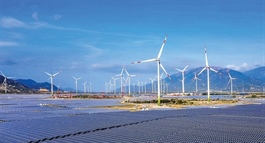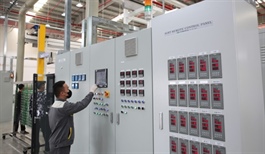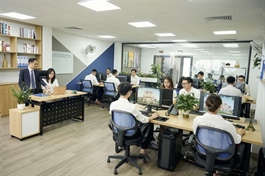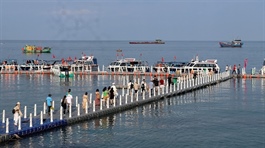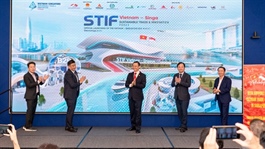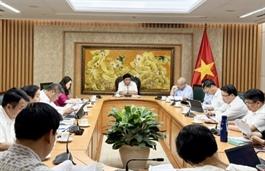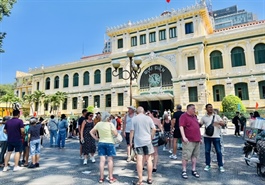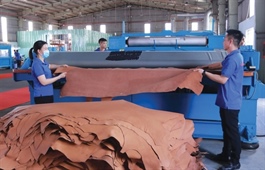Added pillars emerge for Singapore-Vietnam trade
Added pillars emerge for Singapore-Vietnam trade
As Vietnam–Singapore trade accelerates, electronics, machinery, rice, and, renewable energy are set to anchor bilateral momentum.
Latest customs data show bilateral trade reached S$19.5 billion ($15.3 billion) in mid-year, up 28.5 per cent on-year, with Vietnam ranked as Singapore’s 10th largest trading partner.
Electronics and mechanical engineering products continue to dominate Vietnam’s shipments to Singapore, while processed agricultural goods, particularly rice, are playing a stabilising role in the trade balance. Vietnam is expected to help maintain regional supply security in rice, reinforcing its market position amid tightening global food availability.
Singapore’s imports of seafood from Vietnam reached S$57.2 million (over $44 million), up 10.8 per cent compared to the same period in 2024, accounting for 10.2 per cent of the total seafood import market share in Singapore.
Vietnam has temporarily maintained its position as the third-largest seafood supplier to Singapore, after Malaysia and Indonesia. Vietnam is also currently the third-largest rice supplier to the Singapore market, holding a significant market share in both white rice and milled/husked fragrant rice segments.
Renewable energy has emerged as a new pillar. Singaporean investors are actively participating in Vietnamese solar and wind projects, while liquefied natural gas and green hydrogen collaboration is gaining traction under the Green Economy Framework Agreement signed in 2023.
Joint initiatives include power transmission infrastructure, energy storage, and pilot hydrogen supply chains, areas that both governments see as essential to regional decarbonisation targets. Energy cooperation now complements traditional goods trade, creating a wider platform for long‑term economic integration.
According to Cao Xuan Thang, Vietnam’s trade counsellor in Singapore, maintaining Vietnam’s position as one of Singapore’s top partners has reinforced increasingly deep economic ties and laid a foundation for businesses to tap into emerging cooperation opportunities.
“These include linking production and supply chains, entering the halal market, and participating in green and digital projects that both countries prioritise,” Thang said.
To better support Vietnamese enterprises, the Vietnam Trade Office in Singapore will continue to update information on local developments and policies; assist Vietnamese companies in establishing trade connections, showcasing products, and increasing the presence of Vietnamese goods in the market; support exports to Singapore; and facilitate delegations from Singapore to Vietnam in sourcing goods and encouraging industrial, trade, and service investment in Vietnam.
“Vietnamese businesses should stay informed about local regulations to ensure consistent product quality standards, improve packaging design and technology to reduce production costs, and enhance competitiveness in the international market,” Thang added.
The Vietnam Trade Office in Singapore has noted that while overall demand remains robust, competition is intensifying. Singapore’s importers are increasingly seeking not just competitive pricing, but also reliable delivery schedules and high compliance with documentation standards. In this context, exporters who can align logistics precision with market responsiveness are likely to gain an edge.
For logistics service providers, this shift translates into operational demands that go beyond capacity. KFLV, a specialist in the Vietnam–Singapore trade lane, observes that sectors such as electronics, mechanical engineering, and processed agricultural goods will continue to require reliable and timely transportation well into the fourth quarter.
A spokesperson from KFLV said, “Businesses should focus on optimising shipping schedules, ensuring documentation readiness, and partnering with experienced freight forwarders to maximise opportunities in the Singapore market.”
The challenge is particularly acute for small and medium-sized exporters, who may not have the internal resources to navigate complex logistics and regulatory landscapes. Here, partnerships with experienced freight forwarders become critical.
“In the current environment, speed without accuracy is not enough,” the KFLV representative added. “Documentation readiness and alignment with Singapore’s import protocols directly affect whether goods clear customs on time.”
- 13:00 05/08/2025







